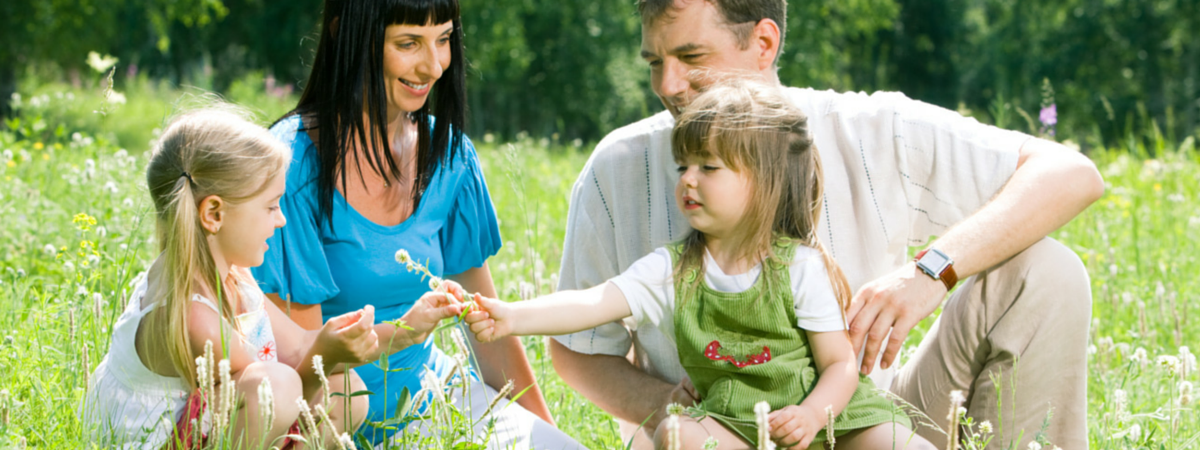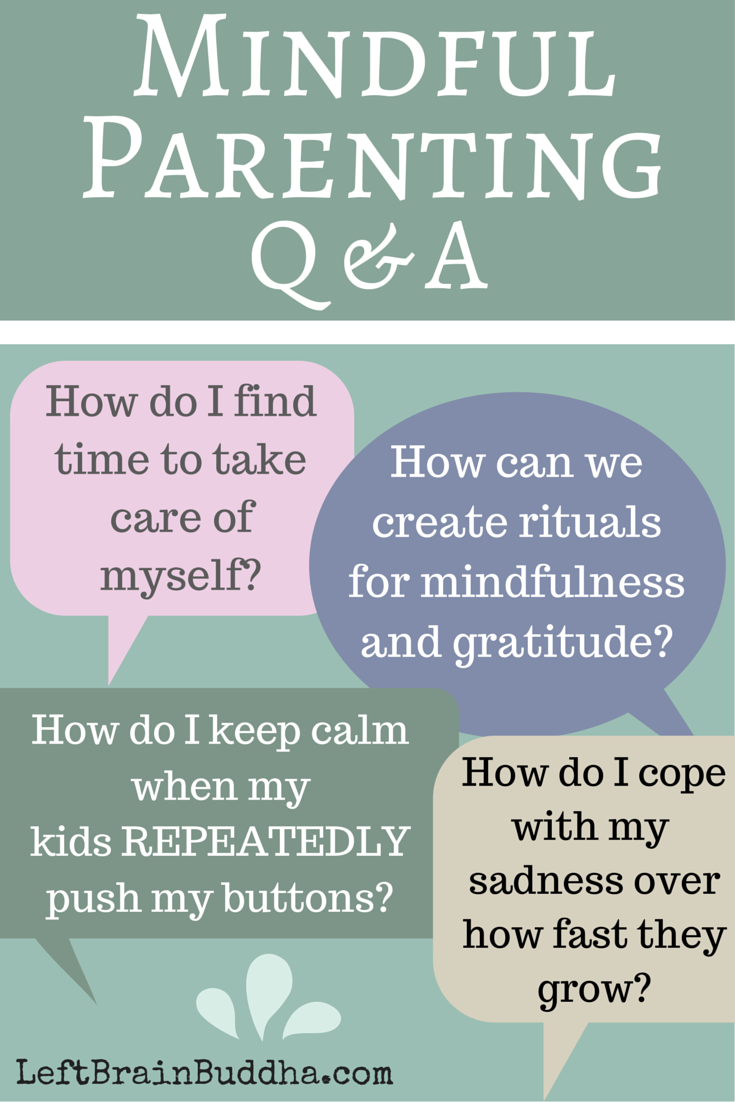 Q: As a mom of two (14 months and 6 years) who also has CFS/ME [Chronic Fatigue Syndrome] I want to be “in the moment” for my kids, but sometimes I’m so exhausted that all I can think about is escape. I try to be gentle with myself and take breaks when I can but lately I’ve really been getting stretched too thin. I’d be interested in your thoughts on finding that balance between self care and caring for others.
Q: As a mom of two (14 months and 6 years) who also has CFS/ME [Chronic Fatigue Syndrome] I want to be “in the moment” for my kids, but sometimes I’m so exhausted that all I can think about is escape. I try to be gentle with myself and take breaks when I can but lately I’ve really been getting stretched too thin. I’d be interested in your thoughts on finding that balance between self care and caring for others.
R: I thought I’d start with an easy one — LOL! This may be the million-dollar question! Taking care of ourselves is essential, and even more so when we are dealing with chronic illness. First, I want to say that it is TOTALLY OKAY TO NOT BE “IN THE MOMENT” with your children all the time. Though I know it’s harder with a 14-month-old, they don’t need to have our stimulating presence all the time. In fact, research indicates that they need time to just be able to explore things on their own. You could put her in a pack-and-play with some toys, or in a jumper or exersaucer while you are nearby but able to rest (perhaps have some tea or read a magazine or do something that is relaxing for you).
Are there options for getting help from family or neighbors? Perhaps taking turns making dinners or watching the children for a time, if that isn’t too taxing?
I appreciate your honesty in writing that sometimes you think about escaping. That is normal, and, as you say, something to accept with kindness and compassion for ourselves.
I’m not sure if this is part of what you meant in your question, but it can be really hard to find time for our own practice with young children. I recently read a post in an online forum by a mother who wrote that she meditates in her child’s room at bedtime. They read a story, then turn on a CD of lullabies — they listen to one song lying in bed together, and then the mom meditates in the room while her daughter goes to sleep. Rocking our children can also be a time for practice. We can try to find ways to incorporate our children into our practice.
And since you mention the word balance, I thought I’d share this post I wrote last winter about how balance is more of a journey than a destination. There will be stages when our children demand more of our attention (like when they’re so little), and stages where they become more independent. There will be days when we can’t find a moment to think, and there will be days when we can have restorative time to ourselves. I kind of like to think of it in terms of our diet — we may not eat a completely balanced diet every single day, but hopefully over the course of the week we get the nutrients our bodies need. We may not have perfectly balanced days, but hopefully over the course of the week we get the nourishment that our souls need.
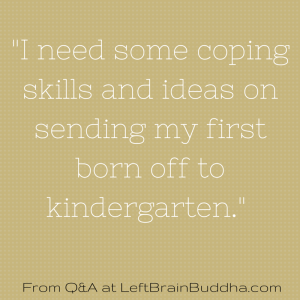 Q: I need some coping skills and ideas on sending my first born off to kindergarten. She is completely ready to go but I get so sad!
Q: I need some coping skills and ideas on sending my first born off to kindergarten. She is completely ready to go but I get so sad!
R: As our kids get older we learn to appreciate the saying, “The days are long but the years are short.” First, be compassionate with yourself and accept that you feel sad. Though the TV commercials tells we should be celebrating as our children leave, often these big milestones are tough transitions for us.
One of my colleagues, whose children are a bit older than mine, once said that with each new phase of parenting, she would think, “This age is the best!!” And then they would grow a bit older and start doing new things and she’d say, “No, THIS age is the best!” While we mourn the loss of babyhood joys, we also enter into amazing new discoveries with them, like learning how to read and going to birthday parties and having, dare I say, intellectual conversations.
Starting school is a big milestone that probably means both of you are desiring more time together. Carving out time for reconnection at the end of the school day (reading stories or coloring or playing a game) can be comforting for kids and parents.
Ultimately, I find it reassuring through practicing mindfulness that we are being intentionally present with our children. We can’t stop the march of time, but we can take comfort in knowing that we are fully experiencing the moments that we have.
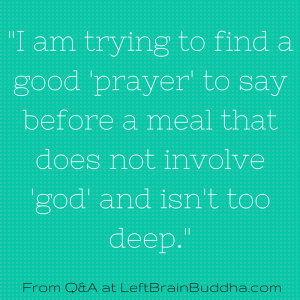 Q: My family is non religious but we are spiritual and I want to teach gratitude and mindfulness to my children (and myself!). I am trying to find a good ‘prayer’ to say before a meal that does not involve ‘god’ and isn’t too deep. But one that expresses gratitude. Any suggestions?
Q: My family is non religious but we are spiritual and I want to teach gratitude and mindfulness to my children (and myself!). I am trying to find a good ‘prayer’ to say before a meal that does not involve ‘god’ and isn’t too deep. But one that expresses gratitude. Any suggestions?
R: I love Thich Nhat Hanh’s meditations on food, and many could be used as a simple ritual or prayer before a meal. In Peace is Every Step, he writes, “When I hold a bowl of rice or a piece of bread, I know that I am fortunate, and I feel compassion for all those who have no food to eat and are without friends or family.”
You can take a moment to express gratitude to the earth for the meal, for the farmers who grew and harvested the food, the people who delivered it to the store, and so on.
If you’re looking for a more broad prayer that’s not just about the meal, I would suggest a short lovingkindness meditation. Some of the traditional phrases used in lovingkindness practice are “May we be healthy. May we be safe. May we be happy. May we be peaceful.” You could add phrases for gratitude, such as “May we appreciate the beauty in life,” or “May we be grateful for all we have.”
You can also read this post about our nightly gratitude practice, and this post about our bedtime “prayer.”
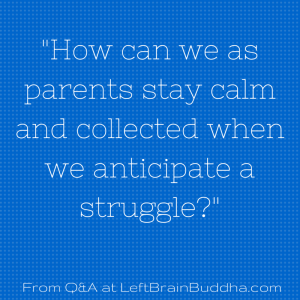 Q: How do you stay mindful and keep it together when your kids are stomping on your buttons. (repeatedly… over and over and over and over until you finally just lose it)? I can stay mindful, in the moment, calm and present for the first 5 consecutive times… but the sixth one gets me.
Q: How do you stay mindful and keep it together when your kids are stomping on your buttons. (repeatedly… over and over and over and over until you finally just lose it)? I can stay mindful, in the moment, calm and present for the first 5 consecutive times… but the sixth one gets me.
Q: Right now my toughie is bedtime. I found your article on the ‘prayer’ bedtime ritual and look forward to starting that. However, we have tried similar rituals but my children still get up out of their beds to play after. I have noticed that I get anxiety at bedtime now. Same goes for clean-up time. How can we as parents stay calm and collected when we anticipate a struggle?
A: These two are very similar — how to stay calm when our children are not! One thing I want to address first is the comment about “anticipating” a struggle. Part of the practice of mindfulness is letting go of expectations, whether it is the expectation that bedtime will be a nightmare, or that it will be a sweet dream. Bedtime will be what it is, and if we start out tense because we’re anticipating a struggle, our children can pick up on that anxiety. This isn’t to say it’s our “fault,” but the latest neuroscience research reveals that emotions truly are contagious.
Additionally, though this sounds so basic it’s almost condescending, it helps to remember that kids are kids. They are impulsive and immature and dealing with a not-fully-developed brain. Simply acknowledging this can go a long way! (And perhaps check out the suggestion in my response to the first question about staying in their rooms in silence at night).
I wrote this post a few months ago, which includes seven tips for maintaining your cool in the midst of parenting chaos. One of the things I wrote in that post is that mindful parenting is not perfect parenting. We will make mistakes, we will lose our cool, and we will say things we regret. Because we’re human. And these moments present us with the opportunity to practice compassion for ourselves.
Finally, mindful parenting does not mean permissive parenting. It doesn’t mean you just sit and chillax with a serene Buddha smile while your son throws toys because “that’s what’s happening in the moment, man….” You set the rules of your home, and you can give age-appropriate consequences to the child who keeps stomping on your buttons. I highly recommend Dan Siegel’s The Whole Brain Child for some very helpful suggestions!
*****
I hope you enjoyed my first Q&A — well, Q&R! Please feel free to share your own responses or suggestions below, and I’d LOVE for you to ask a question for a future installment. {Questions don’t have to be about parenting — they can be about anything related to mindful, joyful, and thought-full living!}

